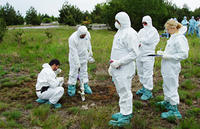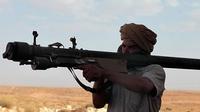-
Push for military tribunals for terrorists
Republican lawmakers in Congress are pushing to include a provision in the 2012 military authorization bill which would require that terrorists who are not U.S. citizens who are caught plotting against the United States, would be in military custody and face military tribunals, even if they are caught in the United States. The Obama administration opposes such a requirement.
-
-
Anwar al-Awlaki and the 9/11 plotters
Representative Peter king (R-New York) wrote to Lt. Gen. Ronald Burgess, director of the Defense Intelligence Agency (DIA), to inquire whether 9/11-related detainees being held by the United States are been interrogated about the possible role U.S.-born cleric Anwar al-Awalki, who was killed by a U.S. drone on 30 September, played in the 9/11 attacks.
-
-
U.S. expands drone war to Horn of Africa
Representative Peter king (R-New York) wrote to Lt. Gen. Ronald Burgess, director of the Defense Intelligence Agency (DIA), to inquire whether 9/11-related detainees being held by the United States are been interrogated about the possible role U.S.-born cleric Anwar al-Awalki, who was killed by a U.S. drone on 30 September, played in the 9/11 attacks.
-
-
Lawmakers seek to protect NY’s growing nanotech industry from terrorists
Last week during a Senate Judiciary Committee hearing, Senator Charles Schumer (D – New York) strongly urged DHS Secretary Janet Napolitano to secure New York’s growing nanotechnology industry against a Mexican terrorist group that has attacked nanotechnology firms around the world
-
-
Terrorism in Africa: Kenyan troops invade Somalia
On Wednesday, Kenya sent its troops some 100 miles inside Somalia to take the battle to the Islamic Al Shabaab organization, killing some 75 militants; yesterday, AU troops stormed a stronghold of Al Shabaab militant group on the outskirts of Mogadishu, while a militia backed by Kenyan troops simultaneously attacked another Shabaab stronghold along the Kenya-Somalia border, taking it over and forcing Shabab fighters to flee; Somalia’s nominal government relies on Ethiopian and Kenyan troops to fight Islamic terrorists in Somalia
-
-
FBI training elite deep-diving counterterrorism unit
To bolster its counterterrorism capabilities, the FBI has created an elite group of special agents trained to track terrorism underwater
-
-
Israel-Hamas prisoner exchange goes through
Earlier today, the initial phase of prisoner exchange between Israel and Hamas has taken place; Gilad Shalit, the Israeli soldier kidnapped by Hamas operatives more than five years ago and held incommunicado since — even the Red Cross was not allowed to visit him — returned to Israel in exchange for 450 Palestinian prisoners held in Israeli jails; in total, 1,027 Palestinian (1,000 men and twenty-seven women) will be released in the exchange; the deal was reached after both Israel and Hamas agreed to major compromises; analysts say that one of the main reasons prompting Israel to show more flexibility was the desire to “clean the table” of troublesome and divisive issues in preparation for a possible Israeli military attack on Iran’s nuclear facilities
-
-
The Israel-Hamas prisoner exchange
If everything goes according to plan, then this coming Tuesday will see Gilad Shalit, the Israeli soldier kidnapped by Hamas operatives more than five years ago and held incommunicado since – even the Red Cross was not allowed to visit him — return to Israel in exchange for 1,027 Palestinian prisoners held in Israeli jails (1,000 men and twenty-seven women); the deal was reached after both Israel and Hamas agreed to major compromises; analysts say that one of the main reasons prompting Israel to show more flexibility was the desire to “clean the table” of troublesome and divisive issues in preparation for a possible Israeli military attack on Iran’s nuclear facilities
-
-
Little progress despite $3.4 billion spent on food safety programs

In the past decade the U.S. government has gone to great lengths to secure the nation’s food supply against terrorists, but more than $3.4 billion later it has little to show for its efforts; despite all the government spending, key food safety programs and counter-terror policies have been bogged down by a murky, convoluted bureaucratic process
-
-
Iranian airline sanctioned for ties to terrorism
On Wednesday the U.S. Treasury Department imposed sanctions on sanctioned Mahan Air, an Iranian airline, for supporting terrorism
-
-
U.S. unprepared for large-scale bio-attack, report warns

On Wednesday, the WMD Center released its latest report that found the United States is unprepared for a large-scale biological attack, despite spending more than $65 billion on biodefense over the past decade; the report warned that the threat of biological weapons is now greater than ever as a result of technological advances; a small team of individuals with training in key disciplines can produce “the type of bioweapons created by nation-states in the 1960s”
-
-
U.S.: Iranian agents tried to kill Saudi ambassador to U.S.

The U.S. attorney general Eric Holde rannounced yesterday that the U.S. government has foiled an Iranian plot to assassinate the Saudi ambassador to the United States; Iran wired $100,000 into a U.S. bank account in August as a down payment for the hit; the assassins — the Iranians thought they were members of a Mexican drug cartel — were to receive $1.5 million if the hit was successful
-
-
Concordia Summit: sustaining "at risk" communities long-term
The high-level Concordia Summit, which gathered heads of state, business leaders, government officials, and counter-terrorism experts to find solutions focusing on public-private partnerships, announces its key findings
-
-
Al Awlaki assassination raises legal questions
Friday’s assassination of Anwar al Awlaki, the radical Yemeni-American imam, by a U.S. drone has sparked fierce criticism from those who argue his death raises a serious question about the government’s counterterror policies; in particular legal authorities, lawmakers, and opinion leaders expressed grave concern over the ability of the government to kill an American citizen with no judicial process far from a combat zone
-
-
NATO: 10,000 Libyan shoulder-fired missiles unaccounted for

Senior NATO officials said that at least 10,000 shoulder-fired anti-aircraft missiles are unaccounted for in Libya, and that at least some of them may have fallen in the hands of al Qaeda operatives; the missiles are known as SAM-7 by NATO designation and 9K32 Strela-2 in Russia, and typically have a range of about four kilometers and an infra-red guidance system; more than forty civilian aircraft have been hit by these portable surface-to-air missiles since 1975, causing about twenty-eight crashes and more than 800 deaths around the world
-
More headlines
The long view
How Male Grievance Fuels Radicalization and Extremist Violence
Social extremism is evolving in reach and form. While traditional racial supremacy ideologies remain, contemporary movements are now often fueled by something more personal and emotionally resonant: male grievance.
